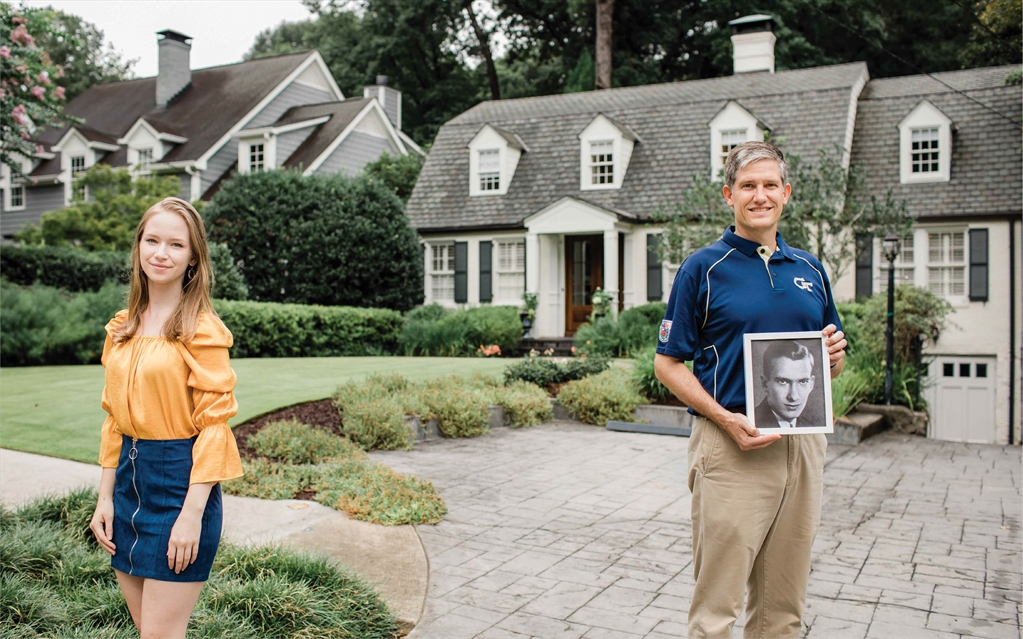The Scholars of Dellwood Drive
By: Carson Vaughan, Photos by: Scott Dinerman, STC 03 | Categories: Alumni Interest

Every few years, humoring a little nostalgia, Randy McDow, executive director of the national Stamps Scholars Program, drives past his grandparents’ old home in Buckhead, just off Peachtree Battle, where the pine trees sway overhead and four small dormer windows study the front lawn like a textbook. Designed by an architecture student at Georgia Tech in 1936, the home once stood alone, breezy on both sides, a world apart—or so it seemed back then—from the buzz of downtown Atlanta. Over the decades, of course, the neighborhood filled in, the trees filled out, and the storybook home at 2540 Dellwood Drive underwent several renovations. And finally, in 1992, his grandparents moved out.
Still, McDow, IE 95, MS PP 03, says the memories remain, dripping from the shutters and the short chimney above. It was during one of these trips down memory lane last June that McDow and his young family noticed something new. Something different. A small lawn sign—Congratulations, Sarah!—a smiling high school graduate standing beside the Ramblin’ Wreck, one hand resting on the fender, all that Tech gold shining behind her.
McDow rolled down the window of his Camry and snagged a quick photo to send off to his family. His grandfather, Randolph “Randy” Whitfield, ME 32, MS ME 34, a pioneering mechanical engineer and the man McDow was named after, was a Georgia Tech man through and through, a proud alumnus, and tireless booster until the very end. Nothing, McDow was certain, would have thrilled him more. “I’m not usually much for signs,” he wrote his family a few weeks later, “but this choked me up pretty good.”
One day, well into his 80s, Randolph Whitfield would look back on his years at Tech and call them “seven of the best years of my life.” He would recall campus visits from national dignitaries like FDR and Charles Lindbergh, and the time Winston Churchill filled the stands at Grant Field. He would remember the inaugural Ramblin’ Wreck parade, and the shirttail parades, too, hundreds of students snaking through the city after a football victory, dancing conga-style away from campus, across the stage at the Fox Theatre, blocking downtown traffic, attracting police and more than a few raised eyebrows. He would remember the 10 calamitous days en route to the Rose Bowl in California, all that mud in Alabama, the broken driveshafts and the burned out headlights and the stories he wired in every night to The Atlanta Journal, which agreed to buy his ticket—though he’d never written for a newspaper—if he’d chronicle the journey.
But perhaps more vividly than anything else, he would remember his blind date with the editor of the yearbook at Agnes Scott, the women’s liberal arts college in Decatur; how a friend of a friend set it all up; how she wrote her name, Shirley McPhaul, on a gum wrapper and slipped it beneath the front gate of the college; how he pretended to be her cousin to slip past the doorman; how “this beautiful girl appeared and held out her arms.”
“She had me,” he said.
Born Feb. 9, 1909, in Tallahassee, Fla., Whitfield was the son of James Bryan Whitfield, former Chief Justice of the Florida Supreme Court. The whole family was academically inclined. His mother was a teacher, his future wife, too. His two older sisters both earned college degrees, one at Emory University, another at Florida State. Whitfield would later follow suit, earning his undergraduate and master’s degrees at Tech, where he quickly learned to keep the academic success of one particular relative, Alonzo Church, to himself.
“My great-great-grandfather was the president of the University of Georgia,” he revealed during a Living History interview for Tech in 1995. “Everybody in the class would have wanted to take a lick at me for that.”

He’d always been “mechanically inclined,” he said, taking apart the radio, puzzling it back together, but few other schools offered a co-op program—a way to pay for school through part-time work—and thanks to the success of Tech football, Whitfield had long been familiar with the school. He enrolled for mechanical engineering in 1927, when hotdogs cost a nickel and a student could earn a four-year degree for $2,000. For the next five years, he rotated between the classroom and the factory floor.
Somehow, amidst all that work and his engineering courses, Whitfield also managed to complete his ROTC requirements and actively participate in campus life—a living paean to extracurricular activity. “He embodied servant leadership way before it was popular,” McDow says. He served as president of the Omicron Delta Kappa leadership society, the Pi Delta Kappa journalism honor society, the Co-op Club, and the Cotillion Club—Whitfield loved to dance. He was also class president, and a member of about a half-dozen other campus groups. It helped that student organizations often paid their officers in those days, especially as the Great Depression wore on, McDow says, but that was hardly his only motivation.
“His family members were public servants and leaders in Florida for a long time, and I think he just saw the benefit,” he says. “It wasn’t an obligation. It was an opportunity to be helpful.”
Whitfield married Shirley McPhaul in 1931, and just a few years later, after he finished his master’s and launched a career with Georgia Power, they settled in at 2540 Dellwood Drive, where they lived for the next 60 years. During that time, Whitfield pioneered the world’s first air-conditioned trackless trolley system, implemented briefly in Atlanta in 1945, and became a passionate advocate for nuclear power.
“He saw responsible use and appreciation for the environment as a key factor in Atlanta being a great city and Georgia being a great state,” McDow says.
Despite an illustrious career, a loving marriage, three kids, more grandkids, and memberships in nearly a dozen professional and environmental organizations, Randolph Whitfield never let his alma mater slide into his past. He served as president of the Greater Atlanta Georgia Tech Club, and trustee of the Tech National Alumni Association. He volunteered as an usher at Bobby Dodd Stadium for 40 years, and in 1995, he earned the Alumni Distinguished Service Award. Even at home, within the family, Whitfield refused to let up. Not long after McDow, his grandson, first started working in the President’s Scholarship office, McDow mentioned that he might forego football tickets to save a little money.“He was just so tickled,” says Croom Whitfield Coward, his daughter. “They have a little signing ceremony, and her parents were there, and Daddy got to meet her and her parents, and it was just a really wonderful experience.”
Georgia Tech initiated the President’s Scholars Program in 1981 as a tool for recruiting the country’s top students. It’s supported by more than 100 endowments. As the years passed, the Stamps Family Charitable Foundation began donating more and more to the program, and eventually became such prominent benefactors that Tech rechristened it the Stamps President’s Scholars Program. The award now includes eight semesters of funding, in addition to $15,000 for international travel and more.
In 2011, McDow moved from Tech to the national Stamps Scholars Program, where he now serves as executive director. When Tech sent over their roster of the 2020 recipients, the address of one particular scholar, Sarah Rutledge, stood out: 2540 Dellwood Drive.
“I about fell out of my chair,” he says. “What a fascinating connection to a Georgia Tech alumnus who would be just tickled pink to have an engineer win the scholarship.”
Whitfield would have been hard-pressed to find a more qualified candidate. When Rutledge was still in middle school, she found her parents watching a documentary about prostheses, how users could now feel sensation and control the newest limbs with their mind alone. “It was a very strange thing,” she says, “but it was fascinating to me.” From that point forward, still approaching her teens, Rutledge was laser-focused on a career in biomedical engineering. So focused she enrolled in the Duke TIP summer camp for biomedical engineering after seventh grade. So focused she interned with Dr. Younan Xia, the Georgia Research Alliance Eminent Scholar in Nanomedicine at Georgia Tech, after her freshman, sophomore, and junior years of high school. “When I saw this research program, it was basically exactly what I wanted to do,” she says. “I immediately had the feeling this is where I want to be.”
Rutledge spent her junior and senior years at Baylor School in Chattanooga, Tenn., where she continued her biomedical studies, executing a research program she designed herself to explore a certain drug resistance in breast cancer patients. Soon enough, she was applying for college, and though she looked at several programs farther north, few shined brighter than the one she knew best.
“I didn’t know that I was going to get into Georgia Tech. I screamed and jumped up and down,” she says. “And then an hour later, the semifinalists for the Stamps Scholarship showed up [online] and I could not believe it.”
After she’d finally been named a Stamps President’s Scholarship recipient, she received a strange request. Call Randy McDow, they said. He has a crazy story to share.
“It was just kind of a crazy feeling,” she says when McDow told her about the connection. “Especially knowing that his grandfather went to Tech, and Randy was a [President’s] Scholar, and it was a Georgia Tech person who built my home.”
Rutledge, now 18, plans to follow the pre-health track and minor in German, and though she hasn’t yet decided what extracurriculars she might pursue, she possesses a Whitfieldian ambition for the next four years.
“I never would have expected to be one of the people they offered a scholarship to. The responsibility to represent Georgia Tech in a good way, and to make a difference with the resources that we’ve been given—I think that’s the most important thing for me,” she says. “To make myself worthy of receiving it.”


